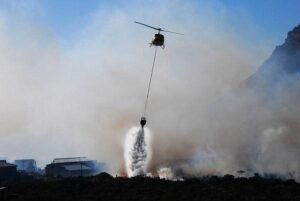How to look for and mitigate potential threats affecting the entertainment industry

By AXA XL’s Greg Johnson
Film locations, live events, and scheduled shows of all types are vulnerable to the impact of terrorism or civil unrest shutting down production. What to look for and how to mitigate potential incidents.
In 2015, a bomb exploded inside a popular shrine in Bangkok, Thailand. The event killed 20 people, injured 125 more, and shut down activities in the area, including a big-budget movie production. In Manchester in 2017 a suicide bomber detonated a homemade bomb as people were leaving the Manchester Arena following a concert by American pop singer Ariana Grande. Twenty-three people were killed, including the attacker, and 1,017 were injured, many of them children.
It can happen in Detroit as much as it can in Dubai. In fact, no location is immune to the impact that acts of terror and civil unrest can have on a film production, live event or show. Productions of all types in all locations around the globe are vulnerable to terrorism, sabotage, war, strikes, riots and civil commotion.
In familiar places as well as remote places, acts of terror or unrest have already occurred. London Bridge in London was where a scene from a James Bond movie was filmed. It was also the scene of terrorist attacks in 2017 and 2019. Netflix’s Lupin was filmed in and around Paris, a city that was struck with a coordinated set of attacks in November 2015.
Threats of such business interruptions are not reserved for movie sets and stages, either. Entertainment industry offices and studios could be vulnerable to acts of war, riot activity, targeted protests, even coups d’état or declarations of martial law.
These events are happening in places that many would consider to be low-exposure areas. For example, in France in 2018, a series of weekly protests known as the Yellow Vest Protests saw as many as 300,000 people across the country head to the streets to protest fuel tax increases and fuel price hikes. The protests shut down the city, with protestors blocking roads, burning barricades, setting fires and vandalizing businesses.
Strikes, riots, civil commotion can happen anywhere there is general unrest over political or economic conditions. In Colombia, a tax reform bill spurred days of massive protests. Riots and protests in Chile have been ongoing for three years over economic conditions. In South Africa, the president’s indictment and sentencing resulted in protests that killed 70 people.
Any business operation, be it a film set or production office, can be impacted significantly by such events. Even in cases in which direct physical damage did not occur, the economic impact can be great. During the Yellow Vest Protests, small retailers in France reported a 20-40 percent decline in revenue, and hotels had lost 15-25 percent in reservations. Yet such acts of violence or terrorism are not always secondary. The entertainment industry has to be prepared for the very real potential threat of a targeted attack, protest, active shooter, politically motivated acts of violence, even war. Antisemitic rhetoric on social media, politicians or celebrities stoking fear and anger can all impact productions and events that have religious or ethnic themes, producers, or directors.
Growing exposure
The exposures are increasing as more streaming entertainment options become available in countries around the world. Companies are setting up offices and operations everywhere: Netflix has expanded globally, as has Amazon Prime. Other streaming services are available in multiple countries and these organizations have established headquarters in country.
With more production comes more exposure. Supply chain disruptions in Europe could spark protests that could have a direct impact on operations for those entertainment organizations operating in the region. Likewise, developing countries offer tax incentives to production companies to lure them to film in their country. Yet if the general public does not feel that their own basic needs are being met or are living under strict austerity measures, that type of disparity could cause civil unrest that could potentially target the production company.
Protecting the production
To ensure protection from loss, production companies should be conducting a thorough review of the location in which they plan to operate or film or hold an event. Understand the political conditions, the issues that are causing or could cause public protests, and identify the potential for terrorist acts.
Work with a team of entertainment experts to evaluate the loss exposures no matter where your location is. The right team can help you put security protocols in place to lessen any impact from an act of violence or unrest.
From there, work with an insurance carrier that is experienced in covering the entertainment industry and understanding how terrorism and acts of civil disobedience could impact business as usual. AXA XL’s Media and Entertainment insurance is not limited to acts of terror, but can respond to strikes, riots, and civil commotion, political violence and political risk, which are the more prevalent types of exposures that may occur in any location.
Also, we suggest augmenting terrorism insurance with a kidnap and ransom product to ensure your staff and talent are protected. Contact our Security Risks team for more information.
The safer production
It is misguided thinking to assume that acts of terror happen only in developing nations and only on a large scale. Attacks of an ideological nature, such as the one that occurred in Charlottesville, Virginia that claimed one life and injured 35 others, pose the same threat to business as usual as does a larger event. Oftentimes, there is little evidence to predict when violence will erupt.
The demand for more streaming entertainment options continues to grow and reshape the entertainment industry. As productions reach global scale, so too do the issues that threaten to shut down operations.
With pre-planning, your production organization can be aware of and prepared for any potential threat. Understanding the environment and the political and economic landscape of your next venue or film location can help you plan for potential issues or give you ample time to move operations to a more stable environment, thus keeping your production on track.





